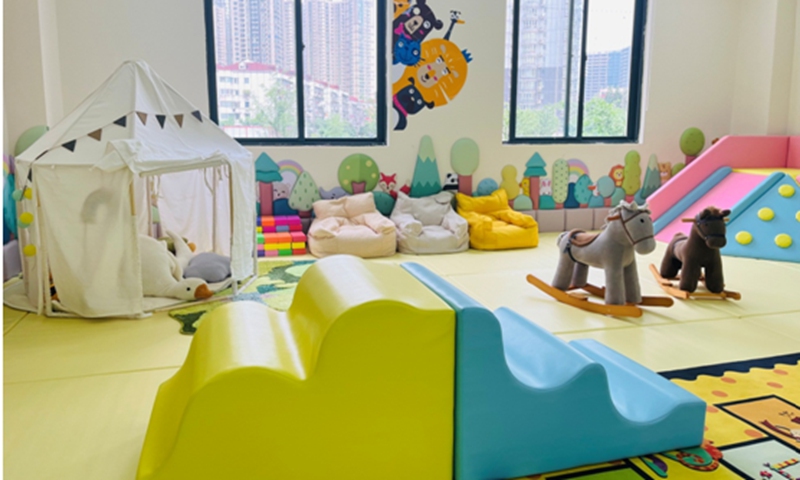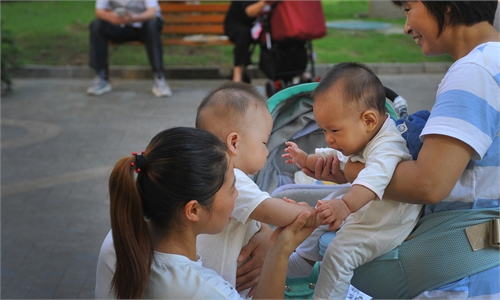Chinese cities improve childcare services with ‘Baby House’ & more non-profit nursery institutions

The Baby House located in Jiaxing Road in central Shanghai. (Photo: Courtesy of Jiaxing Road subdistrict)
In the bright room decorated with cute cartoon images, a little girl is playing with the building blocks, and near her a little boy is reading a picture book. They are surrounded by a pink-and-blue slides, a gray fluffy rocking horse and some adorable plush dolls.
The 60-square-meter room, located at a citizen service station in the Jiaxing Road subdistrict in central Shanghai, is a newly-built non-profit childcare center for babies aged zero to three.
The center is called “Baby House,” a name that sounds similar to “hug me” in the Shanghai dialect. Building Baby Houses across the city has become one of the major tasks of Shanghai’s government this year to further improve its public nursery services, said the city’s education authority in May.
Baby House
Since its opening to the public on January 9 this year, the Baby House in the Jiaxing Road subdistrict has served more than 550 nearby families, said Wang Caihong, who is in charge of the Baby House.
The Baby House is accessible from Mondays to Fridays, providing non-profit under-threes temporary nursery services. It also holds parents-child and early education activities, according to Wang.
The Baby House is cleaned and disinfected every day, she explained.
There are some 85 under-threes living around. “Each day, 10 to 15 babies come to the House,” Wang told the Global Times.
Two-year-old boy Hengheng and his grandmother regularly go to the Baby House.
“Hengheng had participated in three parents-child activities there and his performance was beyond my expectations: he could follow the staffers’ instructions very well and had lots of fun,” said Hengheng’s grandmother.
She then went on to praise the warmth and patience of the Baby House’s staff. “They teach babies good habits and they are good at inspiring the babies to learn and practice,” she told the Global Times.
For some tired parents and grandparents who are busy looking after the babies, the Baby House can be a place for them to slow down for a while.
Grandmother of two-year-old girl Anan, said that Anan had recently become quite “stubborn,” making getting along with the little girl a bit difficult and energy-draining.
“So I sent her to the Baby House, which allows me to relax for a while and also learn communication and chilcare skills from the staff there,” she told the Global Times.
Each year, a baby can access the nursery for free for a total of 12 times and after that their families can still continue to enjoy the activities there at a very affordable, explained Zhou Yaming, director of the Shanghai Education Commission.
The Baby House project has started being rolled out in 2022 and it has now started to take shape in Shanghai. The project is expected to cover more than 85 percent of the under-threes across all the city’s more than 200 subdistricts by 2025, reported thepaper.cn.
A pro-natalist policy
Nursery service has been in great demand for China’s double income families with under-three babies, as their children are too young to enter public kindergartens.
To meet the demand, building non-profit institutions like Shanghai’s “Baby House” has become a pro-natalist policy for Chinese regional authorities.
In Zhengzhou, Central China’s Henan Province, the city government reportedly vowed to build non-profit nursery institutions in every subdistrict by the end of 2023. Each of the institutions is planned to serve no fewer than 30 babies, according to local media.
The Government of Chengdu, Southwest China’s Sichuan Province, will also improve the city’s childcare services by subsidizing local nursery institutions and directly buying services from the latter. Through these efforts, local families can enjoy high-quality nursery services at relatively low prices, according to Chengdu media.



